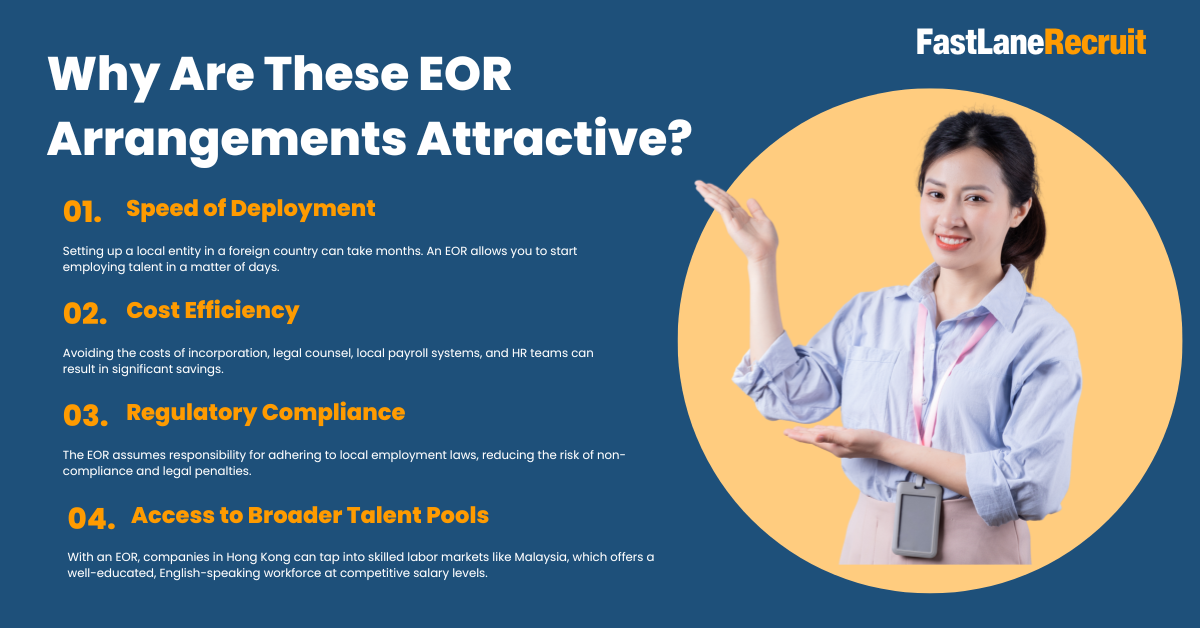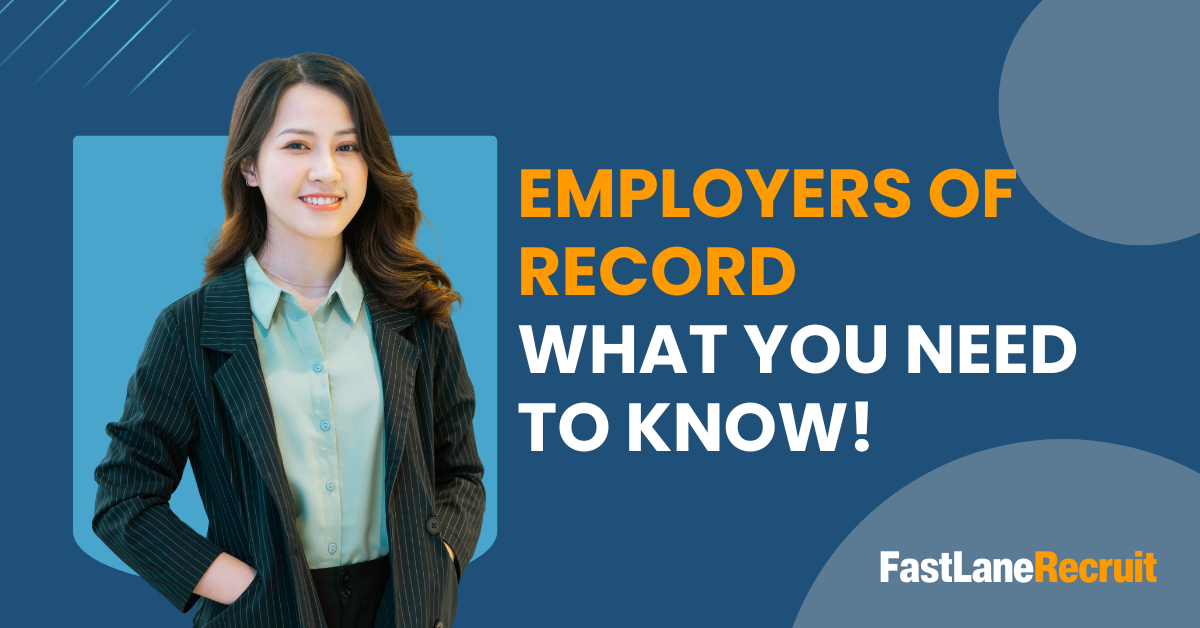In today’s competitive and globalized job market, businesses are constantly seeking flexible, efficient ways to hire international talent without the complexities of setting up entities abroad. For Hong Kong businesses looking to scale quickly and cost-effectively, Employer of Record (EOR) services offer an ideal solution.
This blog post explores the essentials of EOR arrangements, why they are becoming increasingly popular, the legal and tax implications, and how your company can safely engage with this model, especially when hiring talent from regions like Malaysia.
Content Outline
Key Summary
An Employer of Record (EOR) allows Hong Kong businesses to hire foreign talent, like in Malaysia, without setting up a legal entity.
EORs handle all local employment responsibilities, including payroll, tax compliance, statutory contributions, and employee contracts.
These arrangements are attractive for businesses looking to expand quickly and compliantly, especially in new or unfamiliar markets.
The EOR acts as the legal employer, while the client company directs day-to-day work and manages performance.
Businesses should be aware of key risks, such as being deemed the actual employer, triggering permanent establishment, or violating employment agency laws.
Following best practices, such as choosing a reputable EOR, clearly defining roles, and reviewing compliance, helps avoid legal and tax exposure.
FastLaneRecruit enables Hong Kong companies to hire top Malaysian talent efficiently, compliantly, and without entity setup, backed by local expertise and regional support.
What is an Employer of Record?
An Employer of Record (EOR) is a third-party service provider that legally employs workers on behalf of a client company. The EOR takes on all formal employment responsibilities, such as payroll, tax filing, statutory benefits, employment contracts, and compliance with local labor laws, while the client company directs the day-to-day activities and work of the employee.
This model allows companies to:
- Hire talent in foreign jurisdictions without setting up a legal entity
- Stay compliant with local employment laws
- Manage cross-border payroll with ease
- Focus on business growth while administrative tasks are handled externally
In Hong Kong, this model is particularly useful for small to medium enterprises (SMEs) and startups expanding into Southeast Asia.
Why Are These EOR Arrangements Attractive?

The rise in remote work and cross-border talent acquisition has made the EOR model increasingly attractive for several reasons:
1. Speed of Deployment
Setting up a local entity in a foreign country can take months. An EOR allows you to start employing talent in a matter of days.
2. Cost Efficiency
Avoiding the costs of incorporation, legal counsel, local payroll systems, and HR teams can result in significant savings.
3. Regulatory Compliance
The EOR assumes responsibility for adhering to local employment laws, reducing the risk of non-compliance and legal penalties.
4. Access to Broader Talent Pools
With an EOR, companies in Hong Kong can tap into skilled labor markets like Malaysia, which offers a well-educated, English-speaking workforce at competitive salary levels.
Also Read: The Ultimate Playbook for Building and Integrating Offshore Teams
How is the Engagement Structured?
Engaging with an Employer of Record (EOR) typically involves a tripartite relationship between the client company (you), the EOR provider, and the employee. While the EOR is the legal employer on paper, the client retains functional control over the employee’s daily work responsibilities. Here’s a breakdown of how the engagement is usually structured:
1. Service Agreement Between Client and EOR
The relationship begins with a commercial service agreement between the client company and the EOR provider. This agreement outlines:
- Scope of services (e.g., payroll, benefits administration, compliance)
- Service-level expectations and reporting structures
- Fees, invoicing, and payment terms
- Terms of employee onboarding and termination
- Risk allocation and liability clauses
2. Employment Contract Between EOR and Employee
The EOR signs a local employment contract directly with the employee, in accordance with local labor laws (e.g., Malaysian Employment Act 1955). The contract usually includes:
- Job title and description
- Working hours, compensation, and benefits
- Statutory entitlements (leave, termination, insurance, etc.)
- Jurisdiction-specific clauses (e.g., income tax obligations, EPF/SOCSO in Malaysia)
Though the EOR is the legal employer, the employee performs duties under the direction of the client. This relationship is often referred to as a co-employment model, where the operational oversight and performance evaluation are handled by the client company.
Also Read: Build Your Offshore HR and Payroll Management Team in Malaysia
3. Payroll and Compliance Execution
The EOR is responsible for:
- Running payroll in the local currency and remitting appropriate taxes
- Managing statutory contributions (e.g., EPF/SOCSO in Malaysia)
- Handling employee benefits like health insurance or allowances
- Ensuring that employment documentation and processes meet local regulatory requirements
The EOR invoices the client monthly for the total cost of employment (wages, benefits, tax, insurance) plus an administrative fee.
4. Ongoing HR and Legal Support
A reliable EOR provider also delivers:
- HR support for the employee, including dispute resolution or performance issues
- Regular legal updates to ensure evolving compliance
- Coordination of employment terminations or renewals, including proper exit processes in line with local employment laws
This structured engagement enables the client to focus on business growth while minimizing compliance risks and administrative burdens across borders.
Also Read: Guide to PEO vs EOR
What Are the Key Risks?
While EOR arrangements are beneficial, businesses must be aware of potential legal and tax risks that may arise.
1. Employment Agency
In Hong Kong, there is a distinction between EOR services and employment agencies. Employment agencies are regulated under the Employment Ordinance and must be licensed under the Employment Agency Regulations by the Labour Department.
Using an EOR may, in some cases, resemble an unlicensed employment agency if it is not structured properly. To mitigate this risk, ensure that the EOR is not merely brokering the hiring process but genuinely acting as the legal employer.
2. Deemed Employee of the Client
There is a risk that the EOR employee could be legally deemed an employee of the client company, especially if:
- The client exerts significant control over the employee
- There is no distinction between the client’s employees and the EOR employee
- The EOR arrangement lacks a clear service agreement
This may trigger liability under local employment laws, including obligations for severance pay, unfair dismissal claims, and MPF (Mandatory Provident Fund) contributions.
Refer to the Employment Ordinance (Cap. 57) for more information.
3. Permanent Establishment Corporation Tax Risk
Engaging talent through an EOR does not automatically shield a company from corporate tax implications. If the foreign employee is seen as creating a permanent establishment (PE) for the Hong Kong company in another jurisdiction (such as Malaysia), the company could become liable for local corporate tax.
The OECD’s guidance on PE risks is relevant here, and you should consult with local tax advisors. In Hong Kong, the Inland Revenue Department (IRD) outlines these risks under cross-border taxation rules.
Best Practice Guidance
To ensure a successful and compliant EOR engagement, Hong Kong businesses should follow these best practices:
1. Select a Reputable EOR Partner
Not all EOR providers are equal. Choose one that:
- Has a strong local presence in the country where you’re hiring (e.g., Malaysia)
- Understands local labor laws, tax systems, and employment practices
- Can provide transparent pricing and detailed breakdowns of employer obligations
Pro tip: Ask the EOR provider for a sample employment contract and breakdown of statutory obligations in the local jurisdiction.
Also Read: Guide to Payroll in Hong Kong
2. Clearly Define Responsibilities
Ensure that the service agreement explicitly outlines:
- The division of responsibilities between the client and the EOR
- Who handles employee onboarding, training, and management
- Confidentiality and data protection obligations
- Termination and severance policies in both jurisdictions
This clarity protects both parties and avoids disputes over responsibility and liability.
3. Maintain Distinction Between EOR Employees and In-house Staff
To reduce the risk of the employee being deemed a direct employee of the client, it’s best to:
- Maintain separate systems for payroll and benefits
- Avoid issuing client-branded employment documents or email addresses unless necessary
- Communicate to the employee that they are formally employed by the EOR, not the client company
This helps demonstrate the EOR’s legal employer status and protects the client from unintended legal liability.
4. Conduct Compliance Reviews
Periodically review:
- Employment contracts
- Payroll records and tax filings
- Employee benefits and leave entitlements
- Local legal updates (e.g., changes to Malaysia’s employment or tax laws)
In Hong Kong, ensure that your EOR arrangements do not violate the Employment Agency Regulations under the Employment Ordinance (Cap. 57) or lead to corporate tax exposure under permanent establishment rules (Inland Revenue Department – DTA Information).
5. Ensure Data Security and Privacy Compliance
Cross-border employment often involves the transfer of personal data. Ensure your EOR complies with:
- Hong Kong’s Personal Data (Privacy) Ordinance (Cap. 486)
- Malaysia’s Personal Data Protection Act (PDPA)
Always ensure sensitive employee information is stored securely and transferred using encrypted systems.
6. Plan for Exit and Transition
If you decide to set up a local entity or change EOR providers, have a clear offboarding and transition plan. The EOR should support:
- Smooth employment transfer or contract termination
- Final payments and statutory clearances
- Handover of employee records and documentation
Conclusion
The Employer of Record model presents a strategic advantage for Hong Kong companies seeking to hire international talent, particularly from emerging and skilled labor markets like Malaysia. While the model offers speed, cost savings, and flexibility, it also requires careful legal structuring and due diligence to avoid employment law and tax pitfalls.
Conclusion: Why Building a Malaysia-Based IT Team Is the Smartest Move
While IT outsourcing is often praised for its flexibility and cost-effectiveness, building and managing your own dedicated IT team in Malaysia offers a smarter, more sustainable solution for Hong Kong companies. With FastLaneRecruit as your trusted Employer of Record (EOR), you can tap into Malaysia’s top-tier tech talent at up to 60% lower cost than hiring locally in Hong Kong while maintaining full control, visibility, and long-term team engagement.
Unlike traditional outsourcing, our EOR model enables you to build your own offshore team that operates just like an in-house department. You retain direct communication, manage workflows on your terms, and align team culture with your company values, without the legal or administrative hassle of setting up a foreign entity.
Whether you’re scaling your digital product team, modernizing legacy systems, or driving regional growth, FastLaneRecruit helps you build a high-performing IT team in Malaysia with the speed of outsourcing and the control of in-house hiring.
Ready to build your Malaysia-based IT team?
Book your free discovery call today and see how FastLaneRecruit can help you scale smarter.


